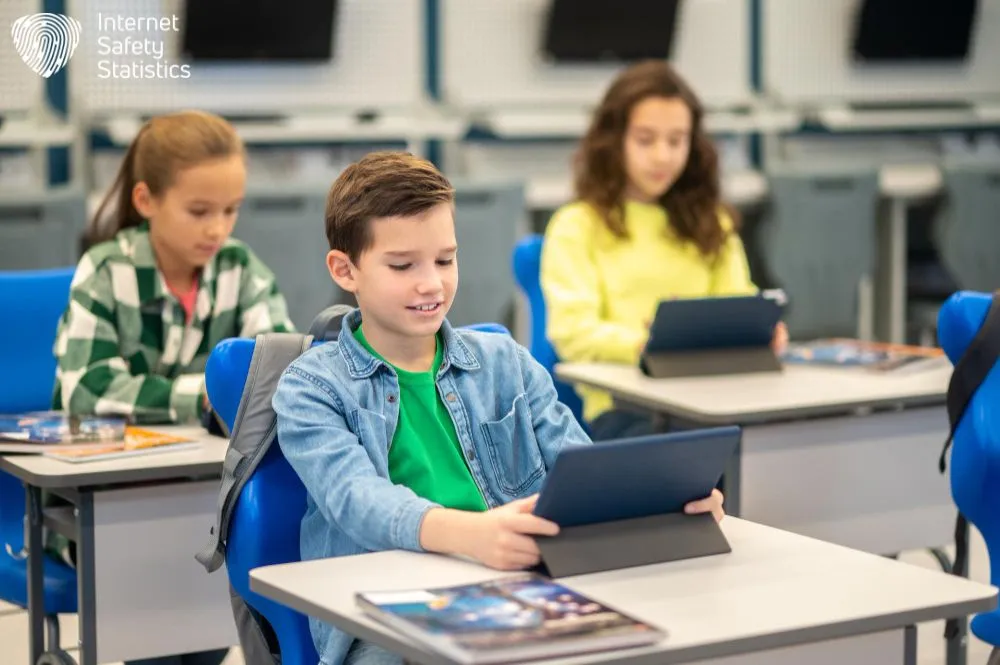
As technology continues to revolutionise education, ensuring safe internet use at schools has become a pressing concern for educators and administrators alike. In this article, we delve into the challenges and opportunities presented by the digital age in educational settings.
From addressing cyberbullying and inappropriate content to fostering digital citizenship skills, we explore practical steps that schools can take to promote responsible and safe internet use among students. Join us as we navigate the complexities of online safety in the modern classroom and empower educators with actionable strategies for creating a secure digital learning environment.
Common Scam Methods to Watch Out for
Be aware of phishing scams, fake websites, and social engineering tactics when using the internet at school. These are common methods used by scammers to trick students into giving away personal information or clicking on harmful links.
Phishing Scams
Phishing scams are tricky and misleading emails or messages that look like they’re from a trusted source but aren’t. They often trick people into giving away sensitive information like passwords or bank details. Cybercriminals craft these messages to seem urgent, making you think you must respond quickly. Always double-check the sender’s email address and hover over any links before clicking to ensure they lead where they claim to.
To outsmart these scams, teach kids never to share their personal data online unless it’s absolutely necessary and approved by parents. Stress the importance of questioning anything that asks for private info, such as your home address or school name.
Keep an eye out for odd spelling or grammar in emails—this can be a red flag that something is not right. Make sure children understand what phishing looks like so they can spot and avoid these traps on their own.
Fake Websites
To avoid falling for online scams, it’s important to be wary of fake websites. Always double-check the URL and make sure it matches the official website. Remember that reputable companies will never ask for personal information via email or pop-up windows on their websites.
Be cautious of unfamiliar links and always verify the legitimacy of a website before entering any sensitive data. Avoid clicking on suspicious ads or offers, and encourage children to seek parental guidance if they come across any questionable websites. By staying vigilant and teaching kids about the risks associated with fake websites, you can help protect them from potential online threats.
Social Engineering Tactics
Be aware of social engineering tactics used by scammers to manipulate and deceive individuals into divulging confidential information or performing certain actions. Scammers may impersonate trusted entities, such as a school or a friend, to gain the trust of students or employees and obtain sensitive data like passwords or personal details.
Educate children and colleagues about the importance of verifying requests for personal information before sharing any details online to prevent falling victim to these deceptive tactics. Implement strict guidelines in schools and workplaces to educate individuals on recognising social engineering attempts, safeguarding against potential threats, and ensuring safe internet use practices.
Internet Safety Do’s: How to Ensure Safe Internet Use at Schools
Be cautious of what you share online, and always think before posting. Only interact with people you know in real life and avoid accepting friend requests from strangers. Use strong and unique passwords to protect your accounts from hackers.
Be Cautious of What You Share Online
Safeguard personal information from potential harm by refraining from sharing passwords, addresses, or school details online. Choose secure and unique passwords for every account to prevent unauthorised access and protect your privacy.
Encourage children to be mindful of the information they share online to ensure their safety and well-being. Exercise caution when sharing personal details on the internet to safeguard against potential threats or scams. Ensure that students understand the importance of protecting their privacy online by not disclosing sensitive information without parental permission.
Only Interact with People You Know in Real Life
The internet is an amazing playground for kids, bursting with information, games, and opportunities to connect with others. But just like any playground, it’s important to set some ground rules to keep them safe. One crucial rule is to limit online interactions to people they already know in real life. Imagine the internet as a giant schoolyard—it’s okay to chat and play with classmates, but venturing off to unknown corners to talk to strangers can be risky.
By focusing on friends and family online, you create a familiar and safe space for them to explore. This doesn’t mean they can’t discover new things! You can help them find age-appropriate online communities or educational platforms that focus on positive interaction. Remember, online safety is all about building good habits early on. By teaching them to stick with familiar faces online, you’re giving them a strong foundation for navigating the ever-expanding digital world.
Use Strong and Unique Passwords
Create and maintain strong, unique passwords to secure your children’s online accounts and protect sensitive information. Avoid using easily guessable phrases or personal details in your passwords. Encourage children to use a combination of letters, numbers, and symbols for added security.
Ensure that each account has its own distinct password to avoid multiple accounts being compromised if one password is discovered. Regularly update passwords and consider using a reputable password manager for convenience and enhanced security.
Internet Safety Don’ts
Don’t share personal information online without parental permission, don’t meet up with strangers from the internet, and don’t rely on technology as a babysitter. To learn more about how to keep your child safe while using the internet at school, continue reading below.
Don’t Share Personal Information Online Without Parental Permission
It’s crucial not to disclose personal information online without parental permission. This includes details like your name, address, school name, or contact number. Children should be educated on the potential dangers of sharing such information and encouraged to seek parental approval before doing so.
By instilling this awareness early on, children can better protect themselves from online threats and stay safe while using the internet at school.
Encouraging students to obtain parental consent before sharing any personal details online is essential for their safety. This precaution helps protect them from potential harm and ensures that they are mindful of the information they share online.
Don’t Meet Up with Strangers on the Internet
Never agree to meet anyone in person that you met online, especially for children and teens. Avoid sharing personal information such as your last name, home address, school name, or telephone number without your parents’ permission.
Teaching kids not to overshare personal information online can protect them from potential harm. Children should be cautious about the information they share online to safeguard themselves from potential dangers. Establishing clear rules and guidelines for safe internet use at schools is essential in protecting students from possible online threats.
Don’t Rely on Technology as a Babysitter
Set limits on screen time and encourage a balance of activities. Engage in offline activities with your children to promote social interaction and physical movement. Encourage them to develop hobbies and interests beyond screens, fostering a healthy, well-rounded lifestyle.
Promote open communication with your children about their online experiences. Foster an environment where they feel comfortable disclosing any discomfort or negative encounters online. Establish trust so that they are inclined to share concerns rather than relying solely on technology for companionship or entertainment.
Communication and Monitoring Tips for Parents

Have open and honest conversations with your children about internet safety. Regularly check their online activity to ensure they are staying safe online. Set boundaries and limits for their internet use to protect them from potential threats.
Have Open and Honest Conversations with Your Children
Engage in open and honest conversations with your children about the importance of internet safety. Encourage them to share any online interactions or concerns with you without fear of punishment. This will help build trust and keep communication lines open, allowing you to guide them in making safe decisions online.
Teach your children to be wary of sharing personal information online by discussing real-life scenarios and potential risks associated with oversharing. Use these discussions as opportunities to set clear boundaries and emphasise the importance of safeguarding their privacy while using digital platforms at school or at home.
Regularly Check Their Online Activity
Ensure children’s safety by regularly checking their online activity for any signs of potential threats or inappropriate content. Keep an eye on the websites they visit, review their social media interactions, and monitor their messaging apps to prevent cyberbullying and exposure to harmful material.
By staying actively involved in their online presence, parents can create a safe and secure environment for their children while teaching them responsible internet use.
Encourage open communication with your children about the importance of online safety as you regularly check their online activity. This proactive approach not only helps protect them from potential dangers but also fosters trust between parents and children when it comes to navigating the digital world responsibly.
Set Boundaries and Limits
Setting boundaries and limits for children when using the internet at school is essential for ensuring their safety and promoting responsible online behaviour. Here are some steps parents and educators can take:
- Establish Clear Guidelines: Clearly communicate rules and expectations for internet use at school. Create a written policy outlining acceptable and unacceptable behaviours, including guidelines for appropriate websites and online activities.
- Use Content Filtering and Parental Controls: Work with school administrators to implement content filtering software and parental controls on school devices. These tools can help restrict access to inappropriate websites and content, providing an additional layer of protection for children.
- Set Time Limits: Establish limits on the amount of time children are allowed to spend online during school hours. Encourage breaks from screen time and promote a healthy balance between online and offline activities.
- Lead by Example: Model responsible internet use and digital citizenship for children to emulate. Demonstrate respectful and ethical online behaviour and emphasise the importance of treating others with kindness and empathy, both online and offline.
- Collaborate with School Staff: Work collaboratively with teachers, school counsellors, and administrators to reinforce internet safety messages and ensure consistent enforcement of internet use policies at school.
- Review and Update Policies Regularly: Periodically review and update school internet use policies to reflect changing technology trends and emerging online threats. Stay informed about best practices in internet safety and incorporate new strategies as needed.
FAQs
How can students avoid online threats while using the internet at school?
Students should learn safety rules, apply cyber safety precautions, and use prescribed Internet filtering tools to steer clear from potential online threats.
Why is teaching kids about internet safety important?
Teaching kids about internet safety equips them with essential knowledge on protecting their privacy and helps prevent falling prey to cyberbullying or online scams.
What tips do you have for staying safe when using the Internet for research or homework?
Students must understand how to verify information sources, maintain online privacy awareness by not sharing personal details, and always practise responsible digital citizenship as part of their student digital literacy skills.
How does a school teach its students about preventing cyberbullying?
Schools implement comprehensive programmes that include discussing the impact of words and actions on social media etiquette sessions backed up by strict anti-cyberbullying prevention policies.
In conclusion, safe internet use at schools is crucial for protecting students from online threats. It’s essential to educate children about the dos and don’ts of internet safety, including being cautious with personal information, using strong passwords, and avoiding meeting strangers in person. Parents also play a vital role in monitoring their children’s online activities and setting clear boundaries to ensure a safe digital experience.
